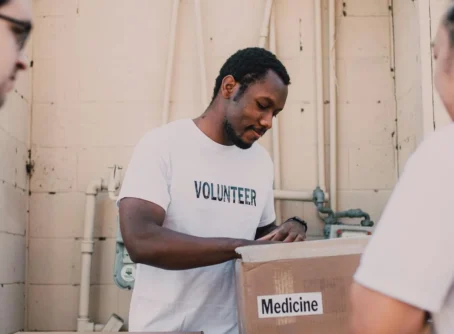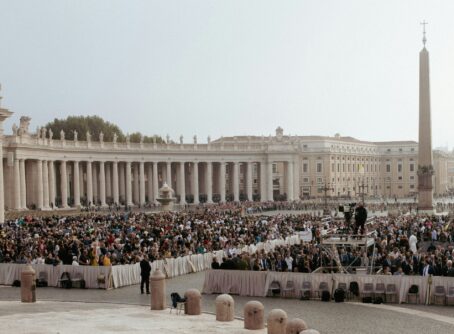For many Christians, our citizenship can best be characterized by the hope that it is somebody else’s job. I am regularly told what I should do or not do to “fix our broken government,” where government is always the adversary, the sole arbiter of our society’s disagreements, or the chief provider for the common good. I am more frequently told that when one looks at the extent of injustice in the world, being a responsible citizen seems overwhelming and futile.
A core part of our vision at the Center for Public Justice is to equip citizens to understand that citizenship is our common calling. Our citizenship responsibilities are a direct response to the command to do justice, love mercy, and walk humbly with our God as articulated in Micah 6:8 and throughout Scripture. Yet God’s good invitation to citizenship in political community has become an invitation many dread receiving.
Can we rediscover God’s good purpose for citizenship? Can we respond to God’s good invitation to citizenship with joy? Here’s why we can say an enthusiastic “Yes!” to what it means to serve our neighbors as citizens and to see citizenship as our common calling.
Let’s start at the beginning.
Creation
God created the world. All that God created was good, including the natural world and human beings.
The story of creation is a story of development and order. Right from the beginning, God created humans with the capacity to take part in the continuing process of cultivating human culture. God then commanded humans to fill and cultivate the earth, and their response is the ongoing act of further developing the potential of what God created. Culture unfurls as humans respond to God, bearing God’s image by using the capacity God has given them for modeling the creativity of God, working together to build families, to develop art and theology, and to fashion a physical world characterized by homes and architecture.
Unlike many familiar political narratives, political communities in this understanding don’t begin with human will or a social contract. It is true that God did not establish explicit political communities at the creation. But the mandate to humans to cultivate culture means that the genesis of political communities is found here. God’s authority over creation remains ultimate, yet God gives humans some responsibility over what has been made.
Corwin Smidt reflects on this in a discussion of traffic lights, “Even in the sinless garden, there may well be a need for some kind of state authority that would, for example, make decisions as to where to install traffic lights and determine how those at such intersections should proceed. It would not be wise to allow traffic lights to be put up by anyone who wished to do so. Such actions may not be morally wrong (sinful) per se, but the ability of individuals to install random traffic lights could well result in confusion, frustration, and possibly chaos.” Smidt goes on to describe the need for this type of structure within a political community to “establish rules related to the use of traffic lights” (e.g. a uniform color scheme), as well as the need for this authority to rightly bear the responsibility to “have its rules followed” such that when all members of a community follow these justly established rules, the whole community flourishes. Concern for our neighbors is the animating principle of such a structure. But sinless neighbor love, exercised only by individuals acting in isolation, is not sufficient to coordinate such a system. Structures of governance within just political communities make manifest love for all our neighbors.
We were made by God with the capacity to bring order to creation. The responsibility humans are given by God to further develop creation points to the foundations of the political community. By implication, humans bear the responsibility to establish political communities – where governments are accountable to citizens and citizens are under government authority – and where both are accountable to God, so all that God brought into being flourishes.
Corruption
Yet all that God made was corrupted by evil.
Humans did not obey God’s directions. Human rebellion meant that every relationship human beings were part of was distorted by sin. Human beings’ relationships with God, with one another, and with the rest of the created order were affected.
While God chooses to give the goodness of the created order and enables all humans to participate in further developing all that God created, the potential of government authority was distorted as a direct result of human rebellion. After human rebellion, the task of any potential government within a political community could no longer be limited to promoting good so that all citizens and the created world would flourish. It became necessary that any potential government also restrain evil and at times compel citizens to conduct themselves in ways that are good.
Humans still bear the responsibility to establish political communities — where governments are accountable to citizens and citizens are under government authority and both are accountable to God — but these political communities now hold the capacity for governments and citizens to be agents of malfeasance.
But this is not the end of the story.
Restoration
God sent Jesus Christ the Lord of all to redeem all things. Jesus’s death and resurrection provided the way in which all things– humans, institutions, and the physical world– will ultimately be reconciled to God and to one other. Until that day, every bit of what God made is under God’s authority, and the call on all human life is to recognize Jesus’s reclamation of all that God created. This call is not for a return to a way of life that looks like the days before distortion. While the biblical narrative begins in a garden, it ends in a city.
Fulfilling God’s calling for us in God’s world means reforming what has been distorted, starting with the world as it is right now, and lining it up with God’s good intention and purpose. This is true for every area of life: our families, our churches, our schools, and our businesses, each one with different God-given purposes to fulfill.
It is also true for our work as citizens in our political communities, which must be lined up with God’s good intention and purpose.
Serving as Citizens
Many Christians know what it means to serve others in tangible ways– ways that are easily understood and applied based on the teachings of Scripture to serve one’s neighbors or to serve the least among us. For example, church members might be tutors in a school whose students may not have a parent at home to help them understand and complete their assignments.
But it is often much harder for us to understand what it means to serve our neighbors or the least among us when it comes to our political communities. Continuing with the previous example, it is harder for tutors to begin thinking like citizens.
Yet consider how at the most local level of political community, citizens might respond to God’s invitation. Citizens begin raising thoughtful questions about the quality of the facilities that affect the children they tutor. Shaped by an understanding of God’s intent for the unfolding of culture and knowing the importance of understanding and interpreting God’s word, these citizens begin to invest time in understanding and discussing what structural factors are at play. They examine where potential injustice resides and what should be done about the current state of the political community so that it begins to resemble the just political community God intended. They begin to fulfill their calling as citizens, participating in the unfolding of the political community. In some cases, this may mean advocating for reforms, or working to help shape new laws and administrative structures and processes that ensure a more just political community for all.
Citizenship as Our Common Calling
Much of what has been said here has laid out the foundation for a Christian response to God’s call to citizenship. This extends to considering the well-being of all our neighbors as well. In this, we must recognize that we share the political communities we are developing alongside those with whom we have deep disagreements regarding our understanding of what it is to be human, the responsibilities of government, and the purpose of our political communities. However, we must do the hard work of remaining committed to the development of political communities that extend justice to all.
This also means that God invites us as citizens to examine our political communities with a critical, but hopeful vision. We must work together to animate, scrutinize, advance, and, when needed, correct through reform our political communities. God invites us to promote public laws that recognize and protect human responsibilities that are independent and distinct from government. Our vision should be that government, whether local, state, or national, makes room for the full breadth of culture to unfurl, so that families, churches, businesses, schools, voluntary associations, and the like develop and fulfill their own God-given responsibilities.
Citizenship is our common calling. In calling us to citizenship, God invites us to develop our abilities to accurately discern the well-being of our political communities. In calling us to citizenship, God also invites us to examine the relations of our political communities to those of other nations in God’s world. In so doing, we tangibly respond to God’s calls to do justice and to love our neighbor.
Citizenship is a calling for a lifetime, one where generations build upon the work of previous generations. In the same way that God invites and equips us to develop the potential of the church and families and art and science and countless other elements of God’s world, God invites us to develop just political communities so all that God made flourishes.
Questions for Reflection:
- Had you previously thought about citizenship as our common calling?
- What are the implications of understanding citizenship as a calling that comes from God?
- God’s call to a lifetime of faithful citizenship means we respond by developing our abilities to accurately discern the well-being of our political communities. It also means examining our national relations to those of other nations in God’s world. What are some ways you can commit to doing that alongside others?





